
Robert Altman's
GOSFORD PARK
GOSFORD PARK
USA Films
USA Films in association with
Capitol Films and the Film Council
A Sandcastle 5 production in
association with
Chicagofilms and Medusa Films
Producers: Robert Altman, Bob
Balaban, David Levy
Director: Robert Altman
Screenwriter: Julian Fellowes
Based on an idea by: Robert
Altman, Bob Balaban
Executive producers: Jane Barclay,
Sharon Harel, Robert Jones, Hannah Leader
Director of photography: Andrew
Dunn
Production designer: Stephen
Altman
Music: Patrick Doyle
Co-producers: Jane Frazer, Joshua
Astrachan
Costume designer: Jenny Beavan
Editor: Tim Squyres
Color/stereo
Running time -- 137 minutes
_________________________________________________________________________________________________________________________________________________________________________________________
Cast:
| Above Stairs:
Sir William McCordle: Michael
Gambon
Lady Sylvia McCordle: Kristin
Scott Thomas
Isobel McCordle: Camilla
Rutherford
Constance, Countess of Trentham:
Maggie
Smith
Raymond, Lord Stockbridge:
Charles
Dance
Louisa, Lady Stockbridge:
Geraldine
Somerville
Lieutenant Commander Anthony
Meredith: Tom Hollander
Lady Lavinia Meredith: Natasha
Wightman
The Hon. Freddie Nesbitt:
James
Wilby
Mabel Nesbitt: Claudie
Blakley
Laurence Fox Lord Rupert Standish:
Laurence Fox
Jeremy Blond: Trent Ford
Ivor Novello: Jeremy Northam
Morris Weissman: Bob Balaban |
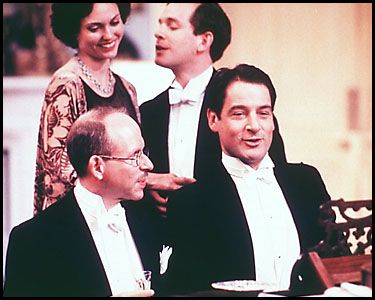
Lady Lavinia Meredith, Lt. Cmdr. Anthony Meredith,
Morris Weissman, Ivor Novello

Constance, Countess of Trentham, with her
maid Mary
Macreachran
|
|
|
|
|
| Below Stairs:
Jennings -- The McCordles'
Butler: Alan Bates
Mrs. Wilson -- The Housekeeper:
Helen
Mirren
Mrs. Croft -- The Cook: Eileen
Atkins
Probert -- Sir William's Valet:
Derek
Jacobi
Elsie -- Head Housemaid: Emily
Watson
George -- First Footman: Richard
E. Grant
Arthur -- Second Footman:
Jeremy
Swift
Lewis -- Lady Sylvia's Maid:
Meg
Wynn Owen
Dorothy -- Still Room Maid:
Sophie
Thompson
Bertha -- Head Kitchen Maid:
Teresa
Churcher
Ellen -- Junior Kitchen Maid:
Sarah
Flind
Lottie -- Junior Kitchen Maid:
Lucy
Cohu
Janet -- Housemaid: Finty
Williams
May -- Housemaid: Emma
Buckley
Ethel -- Scullery Maid: Laura
Harling
Maud -- Scullery Maid: Tilly
Gerrard
Fred -- Bootboy: Gregor
Henderson Begg
|
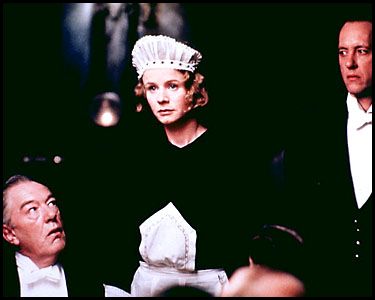
Sir William McCordle with Head Housemaid Elsie and
First Footman George
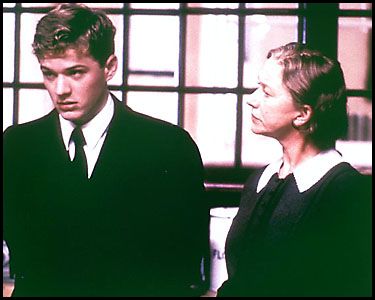
Henry Denton (Morris Weissman's valet) and Mrs. Wilson,
the housekeeper |
|
|
|
|
|
|
| Visiting Servants:
Mary Macreachran -- Constance's
Maid: Kelly Macdonald
Robert Parks -- Raymond's
Valet: Clive Owen
Henry Denton -- Morris Weissman's
Valet: Ryan Phillippe
Renee -- Louisa's Maid: Joanna
Maude
Barnes -- Anthony's Valet:
Adrian
Scarborough
Sarah -- Lavinia's Maid: Frances
Low
Merriman -- Constance's Chaffeur:
John
Atterbury
Burkett -- Constance's Butler:
Frank
Thornton |
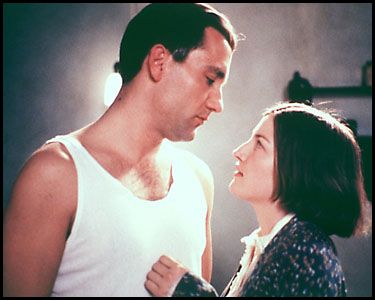
Robert Parks (Raymond's valet) and Mary Macreachran
(Constance's maid)
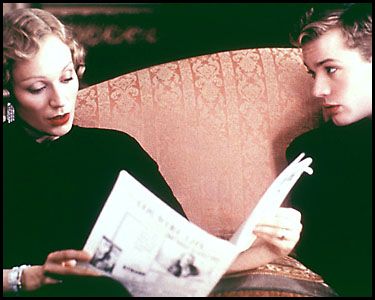
Lady Sylvia McCordle Henry Denton (Morris Weissman's
valet) |
| Outsiders:
Inspector Thompson: Stephen
Fry
Constable Dexter: Ron
Webster |
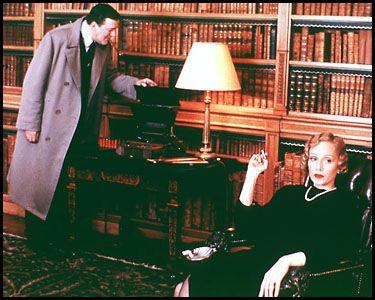
Inspector Thompson and Lady Sylvia McCordle
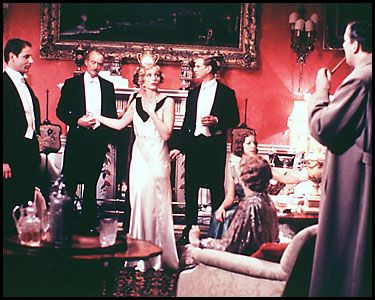 |
________________________________________________________________________________________________________________
Gosford Park
Review by Charles
Schoellenbach
Gosford Park is an entertainment and social
commentary that takes place at the estate of a wealthy English family in
1932. An overnight gathering of relatives and friends serves as a microcosm
for the English titled nobility, including their servants. The audience
is sort of an invisible guest that takes in the little dramas, the off-handed
remarks and the snide insults that are a part of this world of genteel
contention. We are not told what is happening, but better, see it for ourselves,
as if one were peeling away linen from a bed, starting with the bed cover
and working down to the sheets. The movie is so busy with the many characters
and their intertwined lives, it is unclear where the story is going, but
by the end of the film, the pieces have come together. Not too many films
enjoy the process of discovering the subtle workings of people’s lives
as this one does. Gosford Park is a comedy of manners that works on several
levels—it is a murder mystery and a tart satire of the upper class, ending
as a satisfying film.
Sir William McCordle (Michael Gambon) and his
younger wife Lady Sylvia McCordle (Kristin Scott Thomas) are hosts to a
three-day affair at their mansion. Accompanying the guests are their maids
and valets who will share the downstairs servant’s quarters with the McCordle’s
servants. It is the fight that each guest wages to protect their social
and economic standing that drives the story, along with the pretence that
the people who are residing upstairs in the mansion have nothing to do
with the servants living downstairs, beyond each one’s clearly delineated
roles. The film examines each relationship through the master-servant theme
that is the connective tissue of the story. Hypocrisy, snobbery, adultery,
malice and intrigue prevail. Those who claim some association to English
nobility, be it contrived or not, are for the most part rude and pretentious
and incapable of surviving on their own without a satisfactory inheritance
or the golden touch of a benefactor such as Sir William. Otherwise, they
marry into wealth. Ironically, the relationship to their servants, whom
they look down upon but could not live without, runs deeper than this aristocratic
group can imagine.
The story shifts throughout the film between
the upper floors and the servant’s hall, interweaving the two until it
is only a deceit that separates them. The movie does not keep the servants
sequestered downstairs until the guests need them. They are not shadows,
but real people, with lives their employers never acknowledge, let alone
are able to comprehend. Once the guests show up, each strata kicks into
gear. Above, the guests work out the pecking order, as do the servants
in a mirrored mockery below. Jennings (Alan Bates), the Gosford Park’s
patriarchal and stuffy butler, stands present beside the McCordles as they
greet the arrivals. At dinner, he rigidly enforces the seating precedence
at the servant’s dining table, so that it reflects the rules of protocol
practiced upstairs. Constance, Countess of Trentham (Maggie Smith) an outspoken
and nasty-tongued snob arrives with her recently hired, pure-as-milk, Scottish
maid Mary Macreachran (Kelly Macdonald). Mary is slightly overwhelmed amidst
the controlled pandemonium as Mrs. Wilson (Helen Mirren), the no nonsense
Housekeeper and one of the triumvirate that manages the servants, tells
her she will share the room of the Head Housemaid, Elsie (Emily Watson),
a cheeky woman among the servants, who befriends Mary.
Upstairs, The Honorable Freddie Nesbitt (the
title is a humorous stab), played by James Wilby, arrives with his wife
Mabel Nesbitt (Claudie Blakley). Freddie is an unabashed sponger who directs
at Mabel ugly fits of impatience and anger because Mabel’s money has run
out, causing him to beg for handouts from both Sir William and William’s
neurotic daughter, Isobel McCordle (Camilla Rutherford) with whom he shares
a past entanglement. Because the Nesbitts are so low on cash, they cannot
afford a maid for Mabel and must accept the temporary services of Emily,
the Housemaid. After a row between Freddie and Mabel, Emily helps Mabel
with her hair to “make her look respectable”, as Freddie put it. Those
with less power form tenuous alliances if it is only to provide comfort
to one another during their times of misfortune. The short in stature as
well as size Lieutenant Commander Anthony Meredith (Tom Hollander), accompanied
by his wife Lady Lavinia Meredith (Natasha Wightman), is also scrambling
for William’s financial favoritism. Others who are comfortable in their
positions, or who are merely complacent, enjoy the party for the social
diversion it provides. Taking pot shots at others, catching up on gossip
and doing some pheasant hunting are the favored activities. Most everyone
is dismissive of the American film producer, Morris Weissman, played by
Bob Balaban. The people at the party treat Weissman like a package sent
to the wrong address. He got himself invited through his friend, Hollywood
actor, Ivor Novello (Jeremy Northam). Henry (Brian Phillipe), Morris’ recalcitrant
valet with a bad Scottish accent is an example of what happens when a person
crosses class boundaries.
A pheasant hunt at the Gosford Park estate
serves as a metaphor for the inbred hostility that exists among the guests.
Indoors, the sport of choice among this group is to find someone at a disadvantage
and take a shot. Social standing is a common target. The stuffy military
man Lord Stockbridge (Charles Dance) sniffs a condescending response to
Mabel’s mentioning that her mother was a teacher. Ivor Novello, who was
listening to the exchange, sniffs back at Stockbridge as he walks away
from him that Novello’s mother was a teacher as well. No one thin-skinned
could survive long amidst the biting remarks flying through the air. Everyone
knows what is going on in everyone else’s life, so it is not too difficult
to find a vulnerable spot to aim at. Humiliating someone in front of the
guests, causing that person to slip off their pedestal, is a coveted prize.
The center of this world is the host, Sir William,
who has a tight grip on the purse strings, not hesitating to tug at them,
or cut them, on a whim. William has an established reputation, among the
guests and servants. If his satellites do not despise him, they put up
with him because their financial well-being depends upon it. William is
a boor who talks with food sticking out of his mouth and feeds his ever-present
lap dog at the table. The world does not extend beyond his hedonistic desires
for food, sex and power, though a tiny capacity for warmth towards others,
which he never bothered to develop in his life, seeps out through the cracks.
Otherwise, as far as he is concerned, playing a not too bright manipulator
is an entitlement, as it is a distraction with which to fend off boredom.
The people this patriarch has gathered around him fulfill the prophesy
of his disdain. They are not capable of doing much else except scheming
ways to wheedle money and secure a position.
The servants, on the other hand, are maneuvering
in a gloomy labyrinth. Just like their quarters, they live in a world below
the rest that requires acumen and resiliency to get along. The cliché,
that the servants know more than those they work for, is not just a story
device; it is an important theme in the film, examined from several aspects.
Gossip has a two-fold importance in this milieu. Constance encourages Mary
to tell her the gossip she hears from the other servants for its entertainment
value. Gossip also allows a servant to imagine a sense of control in a
world where he or she has little (not to mention living vicariously through
the aristocracy) and even provide information that might help to keep one’s
job. The consequence of a servant losing their job is not cataclysmic,
but they have less to fall back on than any of the upper class. The master-servant
relationships in the sexual liaisons—those that are ordained, and those
that are not—get a close look, too. Only once do a man and a woman stand
as equals, and that is after the realization of love following a comical
conversation. Everywhere else, as much sweat and blood flow from the wrangling
for power as in the actual sex act. Solace exists for the wounded, but
it is a woman who provides it, and usually to another woman. In this arena
the weak join forces, but they do not do much more than commiserate. Rising
above one’s station is near impossible. For all intents and purposes, the
position a person is born with is theirs until they die.
The lingering close-ups of the bottles of poison
that sit quietly on shelves in various parts of the house are a funny melodramatic
touch. In any other film it would be clumsy, but Altman weaves the foreshadowing
of events, together with the depicting a world that eventually corrupts
those it comes in contact with. At the beginning, we are not sure if Altman
is making a symbolic statement or if the poisons are like potential weapons,
forgotten but quietly waiting to stir someone’s imagination. Perhaps both?
As in Cookie's Fortune, and also Dr. T and the Women, Altman is fascinated
with relationships to create a lens through which to look at the characters
from several angles. When a murder is committed in Gosford Park, the act
makes all the sense, but not for the reasons we think. Mary, Constance’s
innocent maid, begins to see her world in a new dark light. Her need for
answers turns her into her own detective, for she knows of things that
the inept Inspector Thompson (Stephen Fry), who is investigating the crime,
has not the slightest clue. Mary’s emphatically held, but naïve, notions
that she lives in a basically good world are threatened. She cannot stop
until she finds the truth, and when she does it changes her forever.
Altman’s film carries on a tradition of social
commentary costumed as a cinematic distraction much like Jean Renoir’s
Rules of the Game. Gosford Park is not a great film. It is speckled with
little flaws, like the missing payoff scene after Anthony Meredith’s revelation
of love. Also, Mrs. Harris’ comment that servants are of ultimately no
importance, although true, is a self-pitying and heavy-handed line that
aches for dry restraint. Freddie Nesbitt and Anthony Meredith, who are
both trying to get money out of William, are too much alike—their situations
and their characters are redundant. The movie’s story is such a kaleidoscope
of personalities and sub-plots that it practically clatters like the shutter
inside an old motion picture camera. And, there are others. But these faults
are not detrimental, and do not really matter. Altman so much relishes
putting together this drama using the connective tissue of greed, sex and
the desire for power, you cannot help but be delighted, and affected by
his work. This is a movie about the pleasure of seeing a story unfold.
The sentiments between the participants are each delicately strained to
reveal the pain they all share to some degree or another, caused by the
destructiveness of this caste system they live with. This is what makes
watching Gosford Park such a treat. Why cannot more movies be like this
one?
This review written in 2002 courtesy
of Charles Schoellenbachs's
Sex,
Bullets & Popcorn Movie Review
Web Site








